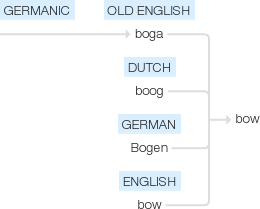Bow
Old English boga ‘bend, bow, arch’, of Germanic origin; related to Dutch boog and German Bogen, also to bow2.
wiktionary
From Middle English bowe, boȝe, from Old English boga, from Proto-West Germanic *bogō, from Proto-Germanic *bugô. Cognate with West Frisian boge, Dutch boog, German Bogen, Danish bue, Norwegian boge, bue, Swedish båge.
From Middle English bowen, buwen, buȝen, from Old English būgan, from Proto-West Germanic *beugan, from Proto-Germanic *beuganą, from Proto-Indo-European *bʰūgʰ-(“to bend”). Cognate with Dutch buigen, German biegen, Danish bue.
From Middle English bowe, bowgh, a borrowing from Middle Low German bôch and/or Middle Dutch boech, from Proto-Germanic *bōguz, from Proto-Indo-European *bʰeh₂ǵʰus(“arm”). Cognate with Dutch boeg(“bow”), Danish bov(“bow”), Swedish bog(“bow”). Doublet of bough.
See bough.
etymonline
bow (v.1)
with a short -o-, Old English bugan "to bend, become bent, have or assume a curved direction; to bow down, bend the body in condescension or reverence, to submit," also "to turn back" (class II strong verb; past tense beag, past participle bogen), from Proto-Germanic *bugon (source also of Dutch buigen, Middle Low German bugen, Old High German biogan, German biegen, Gothic biugan "to bend," Old Norse boginn "bent"), from *beugen, from PIE root *bheug- "to bend." Related: Bowed; bowing. To bow out "withdraw" is from 1942, from the notion of "exit with a bow or bows."
bow (n.1)
"strung, elastic weapon for shooting arrows," Old English boga "archery bow; anything bent or arched, an arch, a rainbow," from Proto-Germanic *bugon (source also of Old Norse bogi, Old Frisian boga, Dutch boog, German Bogen "bow"), from PIE root *bheug- "to bend," with derivatives referring to bent, pliable, or curved objects. The sense of "a looped knot," especially an ornamental one, is from 1540s. The musician's bow (1570s) formerly was curved like the archer's.
The former popularity of the longbow as a characteristic English weapon is attested in expressions such as bow-legged; to have the bent of (one's) bow "know one's intentions or inclinations" (1560s), to shoot in (another's) bow "practice an art other than one's own;" bow-hand "the left hand," hence "on the wrong side, inaccurately;" have two strings to (one's) bow "have more than one means to accomplish something;" draw the long bow "exaggerate, lie."
bow (n.2)
with a short -o-, "forward part of a ship," beginning where the sides trend inward, mid-14c., from a source such as Old Norse bogr, Middle Low German boog, Middle Dutch boech "bow of a ship," from Proto-Germanic *bugon-, from PIE root *bheug- "to bend," with derivatives referring to bent, pliable, or curved objects.
bow (n.3)
with a short -o-, "an inclination of the body or head" (in reverence, etc.), 1650s, from bow (v.1).
bow (v.2)
with a long -o-, "to have or assume the form of a bow," from bow (n.1), by late 18c., but difficult to distinguish in print from bow (v.1). In music, "to perform with a bow upon a stringed instrument," by 1838.
